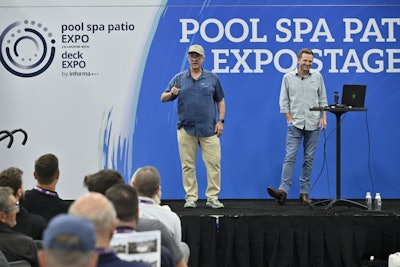When business is good but accounts receivable pile up, profits get stuck in limbo. Two Wisconsin operators — Rene Huston, president of Patio Pleasures (Sun Prairie, Wis.), and Mike Panella, CEO of Swimming Pool Services (Waukesha, Wis.) — have arrived at the same conclusion: collect before you work, not after.
“Our rule is clear: Get the money first,” says Panella. “I don’t like to waste time chasing money. If you didn’t get the money, you can’t defend it by saying, ‘Oh, well, they didn’t have their credit card.’ If they don’t have their credit card, then don’t schedule it.”
Huston echoes the discipline — then unpacks the playbook that makes it work.
“I FOUND OUR CASH-FLOW PROBLEM IN A FOLDER.”
Huston remembers the exact moment she identified the weak point in her business. Nearly 20 years ago, Patio Pleasures was much smaller, still growing out of its early days.
“I looked at this folder of work that we had done but hadn’t collected on yet,” she recalls. “And I said, okay, now I’ve identified our cash-flow issue right here in this folder. We need to put something in place to collect upfront, especially for project-based work and special-order items. And we also need a policy that implements payment upon completion where we’re not waiting for them to pay us — we already have the payment in hand.”
Today, Patio Pleasures’ baseline is straightforward:
Hot tubs and retail: “We have a strategy called a pay-in-full cash discount. The customer feels they’re getting something in return for paying in full. By doing that, when delivery comes up, we’re not scrambling to collect a final balance. If they did not take advantage of the pay-in- full discount for a hot tub, that final payment is due 24 hours before delivery.”
Construction/remodel/service: “We stick very close to 50% down, no matter what it is. Depending on the project, there might be a payment schedule. We really avoid — and have very few instances — where we do work that hasn’t been paid for by the time it’s completed, and that’s really helped us from a cash-flow standpoint.”
They’ve also added ACH alongside cards and financing. “There’s a cost to accept credit cards,” Huston says. “We now have an ACH option. It saves on the fees, and it’s another payment option we can offer. A lot of shoppers can pull their account info up on their phone, so we can run an ACH right then. We don’t want them to ‘go home and get the checkbook’ — because who knows what can happen. We want to solidify the deal.”
SAY IT WITH CONFIDENCE, AND ENFORCE IT FIRMLY
Policy without confident delivery falls flat. Huston trains her team on tone and timing. “It’s more about delivering with confidence and in a matter-of-fact way. If they aren’t confident, and they stumble, the customer can feel that,” she says.
During COVID, Patio Pleasures flexed when lead times stretched. “We offered some flexibility — we’d go back to that 50% rule and collect the balance 24 hours before delivery. Now that delays are mostly gone, we’re back to the pay-in-full cash discount. If someone needs half now and half later, we’ll honor that as a floor at 50%.”
Service scheduling follows the same script, always with a card on file. “Even if the customer feels something might be under warranty (and it may be), we require a credit card. The script is: ‘If it’s deemed warranty, there will be no expense passed on to you. However, if it’s not, here’s what the cost will look like.’ Once work is complete, within 24 hours, our billing team audits the ticket, confirms warranty status, and processes payment if it’s the customer’s responsibility. This way, there are no surprises.”
Documentation backs it up. Calls are recorded, and every appointment is confirmed with an email that outlines notes, ticket details, and billing expectations. “If someone says, ‘You didn’t tell me,’ we go back to the email. Typically, they’ll admit they missed it or it went to spam. If it’s a one-time occurrence, we may extend a courtesy discount, but the workflow keeps us on solid ground.”
For Panella, the same principle is built into company culture. “The team knows that I mostly leave you alone to do your job,” he says. “But if you don’t get the money, you’re going to hear from me. GET THE MONEY. It’s not about the dollar amount, it’s about the principle. If the work is being done, we need the money.”
He applies that firmness across the board, especially with seasonal service. “We get paid, and then we’ll take care of you,” Panella says. “We just had a client who wanted us to maintain the pool we built last year. That’s opening, maintenance, and closing — five, six thousand dollars, all upfront. They tried to negotiate, ‘We don’t want to pay upfront, but we still want the discount.’ Well, this isn’t a negotiation. This is how we do business. If you want this price, you’re going to give us your money right now. A few hours later, I got a text saying, ‘Yep, we’re paid. We’re all good.’”
MAKE DEPOSITS A BENEFIT, NOT A BURDEN
Huston reframes deposits around priority and protection. “We love the priority scheduling approach. For special-order parts or larger projects, we also use price protection — there’s volatility with tariffs and multiple price changes a year. We’ll say, ‘Let’s get this locked in right away so we can lock you into this price.’”
Urgency is honest and practical. “Our schedule can book six, eight, even 12 weeks out depending on the request. That alone usually provides the urgency customers need: ‘Get me on the schedule. Here’s my payment.’”
WHEN CARDS DECLINE, OR CHARGEBACKS HIT
“Most declines aren’t from lack of funds,” Huston notes. “It’s fraud and a new card number. Nine out of ten times, we call and the customer says, ‘I have a new card,’ and we’re golden.”
The harder edge: chargebacks. “It’s very easy for consumers to call and say, ‘I didn’t authorize this,’” she says. “Credit card companies often side with the consumer, so the business has to have proper documentation.”
Her example: “We had a $4,000 chargeback on a liner job. Fortunately, we have a liner agreement that outlines cost and payment schedule, plus email documentation. We turned that in, and Mastercard said, ‘You have what you need.’ We won the case. Without that paper trail, we might’ve been out $4,000.”
WEATHER AND DELAYS
Delays are inevitable, refunds aren’t. “In all of our agreements — we like to call them agreements — there’s a clause the customer initials that weather delays do not qualify for a discount or return,” Huston says. “We can never, ever guarantee a deadline. It’s always our goal, but we can’t guarantee it. So we keep it light and say, ‘Don’t schedule the pool party quite yet.’ As soon as someone sets a party date, the gods above know, and they don’t cooperate.”
KPIS THAT PROVE IT’S WORKING
Patio Pleasures manages to the metrics:
24-hour billing: “We have a goal that everything bills out within 24 hours. Our system tracks how long a service ticket sits once complete — 24 hours? 48? Two weeks? And why.”
Weekly service huddle: “Every week, our billing lead presents what she billed and what got hung up (declines, pushback, denied warranty). It keeps a pulse on the cash cycle.”
Sales incentives aligned to cash: “We incentivize based on how a customer pays — if they pay by ACH, that saves us money, and we’re willing to pass some of that to the salesperson. Sales managers also track whether the team is getting final payment before delivery. We don’t put that on delivery crews, they’re not collectors. They just want to install the hot tub.”
The most effective KPIs are the easiest to measure. Panella tracks the company’s AR list in a glance. “It should be short — less than a page. Right now, there’s maybe five people on my AR list, and that’s about how it should be,” he says.
WHY POLICIES FAIL, AND HOW TO CLOSE THE GAPS
- Missing or expired cards on file → Keep cards on file; audit weekly AR; call fast to update cards. (Panella)
- Customer pushback on prepay → Deliver the policy confidently; pair prepay with value such as priority scheduling, price protection, and a pay-in-full discount. (Huston)
- Small service invoices slipping through → Require a card on file at scheduling; bill within 24 hours of completion; track any ticket that sits. (Huston)
- Chargebacks → Use signed agreements, itemized estimates, and email confirmations to create a paper trail that wins disputes. (Huston)
- Operational delays → Set expectations in agreements (no guaranteed deadlines), communicate early, and avoid “pool party deadlines.” (Huston)
THE TAKEAWAY
Customers today are cautious, and small businesses must be, too. No matter your policy, the objective is the same: keep the cash cycle tight, and the AR list thin.
“Have whatever policy works for you,” Huston says, “but have a policy — and make sure you are collecting upfront. Cash flow is everything to a small business.”
Panella puts it even more bluntly: “Like I say, some things are gray, but money is black and white. If the work is being done, you need the money.”
This article first appeared in the October 2025 issue of AQUA Magazine — the top resource for retailers, builders and service pros in the pool and spa industry. Subscriptions to the print magazine are free to all industry professionals. Click here to subscribe.




